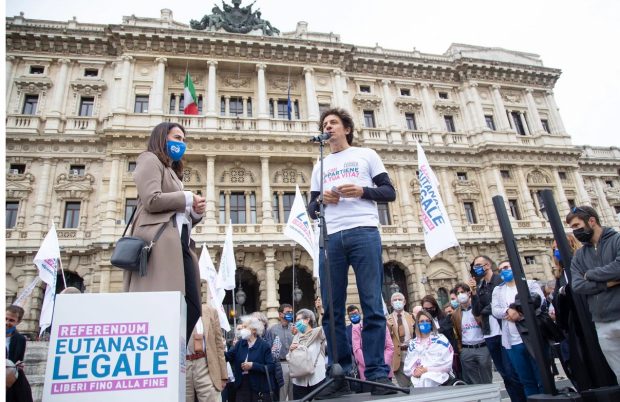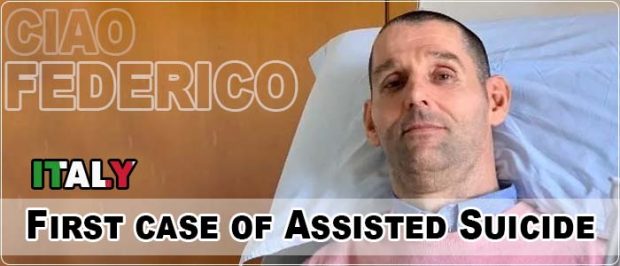June 20, 2022
Italy’s First Assisted Suicide
How Federico became Italy’s First Assisted Suicide, reports the New York Times
ROME — For more than a year, media reports kept Italians up to date on the travails of a 44-year-old man known only as “Mario” as he sought to end his life through physician-assisted suicide.
Paralyzed 12 years ago in a traffic accident, “Mario” faced a series of legal, bureaucratic and financial hurdles in his pursuit of death.
On Thursday, “Mario,” identified for the first time by his real name, Federico Carboni, ended his life, becoming Italy’s first legal assisted suicide, in his home in the central Italian port town of Senigallia.
Mr. Carboni, an unmarried truck driver, was surrounded by his family, friends and people who had helped him to achieve his goal, including officials with the Luca Coscioni Association, a right-to-die advocacy group that assisted Mr. Carboni during the past 18 months and announced his death.
At a news conference Thursday afternoon, Filomena Gallo, national secretary of the association, read from a letter Mr. Carboni wrote last month.
“I can’t deny that I regret taking leave of life, I would be false and lying if I said otherwise because life is great and we only have one,” the letter said. “But unfortunately that’s the way it went.”
Mr. Carboni battled on even as his health deteriorated, Ms. Gallo said. “Federico wanted to exercise his right to free choice in Italy, and he was aware that his resistance would be a right, a freedom, exercised for everyone,” she said.
Mr. Carboni’s case underscores a series of contradictions and constraints of Italian legislation that right-to-die activists have been challenging for decades in a country that is the seat of the Roman Catholic Church, which exerts significant clout on bioethics.
An Italian court ruling has declared assisted suicide permissible in Italy under certain limited circumstances, but there is no legislation enshrining the practice, which for Mr. Carboni, led to delays.
If they are able to, terminally ill Italians can travel to Switzerland to end their lives, but it is a costly and, in most cases, a physically challenging journey.
Marco Cappato, the treasurer of the Coscioni association, said that when Mr. Carboni first contacted him two years ago, he had been planning to go to Switzerland to end his life. Instead, he decided to remain in Italy.
“These two years of stubbornness and determination” allowed Mr. Carboni to be proud to be “the first person in Italy to have obtained medical assistance for a voluntary death,” Mr. Cappato said.
In 2017, the Italian Parliament passed a law giving adults the right to decide their end-of-life medical care, including the terms under which they can refuse lifesaving and life-sustaining treatment, including artificial nutrition, hydration and ventilation.
In a landmark ruling in 2019, Italy’s Constitutional Court said that assisted suicide could not be considered a crime as long as certain conditions were met.
The court had been asked to rule on the indictment of Mr. Cappato, who, in 2017, had helped a blind and quadriplegic man on life support go to a Swiss clinic that provides assisted suicide. Mr. Cappato was charged in a Milan court with abetting suicide, which carries up to a 12-year sentence.
The Constitutional Court ruled that in some cases assisting someone could not be considered a crime as long as the person requesting aid met certain conditions: they had to have full mental capacity and suffer from an incurable disease that caused severe and intolerable physical or psychological distress. They also had to be kept alive by life-sustaining treatments.

Marco Cappato and Filomena Gallo of the Luca Coscioni Association at a rally for a referendum on euthanasia last year in Rome. Italy’s Constitutional Court later rejected a petition for a referendum. Credit: Matteo Nardone
The man Mr. Cappato aided, Fabiano Antoniani, known as DJ Fabo, met the conditions, so Mr. Cappato could not be charged with a crime.
The court urged the Italian Parliament to pass legislation incorporating these principles, and lawmakers are debating one, but until then the court’s ruling is legally binding.
Even with that precedent, Mr. Carboni struggled to get access to physician-assisted suicide. He was forced to repeatedly challenge in court health officials where he lived, so that he could be visited by doctors and by members of the regional ethics committee who could verify the state of his health and mind and eventually sign off on his plan, which adhered to the Constitutional Court ruling.
His case reflects a legislative void in Italy when it comes to such issues.
Earlier this week, Fabio Ridolfi, a 46-year-old who had been paralyzed for 18 years, died in palliative care after his request for assisted suicide dragged on. After lobbying for months — even issuing a heartbreaking video last month asking the state to help him to die — he refused further treatment. He died on Monday.
The Roman Catholic Church is firmly opposed to assisted suicide and euthanasia, which it has called “intrinsically evil” acts “in every situation or circumstance.” Pope Francis has reiterated this position on numerous occasions, though he has been more nuanced when it comes to aggressive medical treatments.
Even the National Bioethics Committee, which informs the government and the medical establishment on a variety of
A law that would allow some cases of assisted suicide in line with the Constitutional Court’s ruling was passed by the lower house earlier this year (with just over half of the house’s 630 lawmakers present for the vote), and it is now being discussed in the Senate.
Mr. Cappato said that as it stood, the proposed law discriminated against terminal patients who did not comply with all four preconditions to assisted suicide, like cancer patients not on life support.
“In Holland, more than 60 percent of euthanasia cases are terminally ill cancer patients who are not attached to machines,” he said. “To exclude such cases from assisted suicide means discriminating against one person out of three.”

Critics of the proposed law say that it could force terminal patients to have tracheotomies or other procedures only for the purpose of accessing suicide assistance.
Moreover, the proposed law doesn’t establish any time limits for decisions. “Obviously, a terminal patient doesn’t always have the time to wait,” Mr. Cappato said in an interview earlier this month.
With national elections less than a year away, some pushing for the law say senators might try to obstruct its passage so that the next Parliament will have to start from scratch.
Annamaria Parente, the president of the Senate committee where the law is being discussed, said she had appealed for quick passage. “It is a duty to go forward,” she said.
Some lawmakers denounced Mr. Carboni’s choice. Mario Adinolfi, national president of the People of the Family party, warned of “destructive and deadly madness,” that would lead to the “slaughter of those who cannot be cured,” the news agency ANSA reported.
In his farewell letter, Mr. Carboni told his family and friends not to be sad.
With the Coscioni association, “we have defended ourselves by attacking, and we have attacked by defending ourselves, we have created a judicial milestone and a piece of history in our country and I am proud and honored to have stood by your side” he wrote.
Don’t cry, he added. “Now I am finally free to fly wherever I want.”
Editor’s Note – the Luca Coscioni Association sponsored the Italian translation of the Peaceful Pill eHandbook.